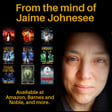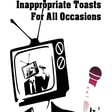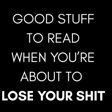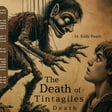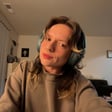Introduction to the Mentally Oddcast
00:00:02
Speaker
You are listening to the Mentally Oddcast, where we talk with creatives about neurodivergence, trauma, addiction, and all the other things that impact and inform our art. Our goal is to show everyone that no matter what you're going through, you are not alone and you can make art about it.
00:00:34
Speaker
You are listening to the Mentally Oddcast. My name is Wednesday, leave Friday, and we are sponsored by Sometimes Hilarious Horror. Please find us on Ko-fi.
Meet Brianna Cox: Playwright and Linguist
00:00:46
Speaker
Today's guest is Brianna Cox.
00:00:48
Speaker
ah Brianna was born and raised in Tullahoma, Tennessee. She is the oldest of seven children and a first-generation academic with degrees in cognitive linguistics, Japanese language, and speech-language pathology.
00:01:03
Speaker
In 2019, she became a fellow with the Tennessee Playwright Studio and has been writing stage plays for low-budget film scripts ever since.
Childhood Fears: Stephen King’s It
00:01:13
Speaker
She has been featured on the 2024 Next List for emerging screenwriters and has placed in the Academy, ah the Nickel Fellowship, ah which I'm actually not familiar with, so we'll have follow-up questions on that.
00:01:27
Speaker
um Hi, Brianna. Thanks for being here. yeah Thank you so much for having me on today. It is a pleasure. Okay, so, you know, we always start by asking guests about the first scary movie that they remember seeing. So let's hear yours, please.
00:01:43
Speaker
yeah I am not sure if this is the first one I've ever seen, but it is the most impactful because I was a poorly supervised child whose parents were constantly playing the sci-fi channel just without any stops.
00:02:00
Speaker
So when I was very young, I saw the first five minutes of the Stephen King's It miniseries. and immediately like left the room and have been terrified of storm drains ever since.
00:02:17
Speaker
I think that's pretty common. It's actually, i think, based on your age, because i find that people like 10 to 15 years younger than me feel the same way about the TV version of It as people in my age group felt about Salem's Lot.
00:02:34
Speaker
Mm-hmm. That it was this TV movie that was just so strikingly violent and scary and unexpected that ah it just kind of blew all our minds and and stuck there for the next couple of decades.
00:02:50
Speaker
Yeah, and if it's any consolation for that, I guess my second answer would actually be like the 2004 Stephen King Salem's Lot miniseries.
00:03:00
Speaker
Oh, right So I don't think which one I saw first. So either way, Stephen King traumatized me as a child. Yeah, he'll do that. i must say, 2004 Salem's Lot was i i think it I think it had a lot going for it, actually, and it fixed a couple of the things that I saw as as errors in casting in the 78 version.
00:03:26
Speaker
So did did you like it? How did it how did it impact you? um I remember being very terrified of the first few episodes before you actually see any like vampire shenanigans as a kid.
00:03:41
Speaker
Where just like, oh, this kid drowned in a lake. Somebody killed him. Oh, there's creepy shadows everywhere. And for some reason, that was very impactful to me. So I have not seen it since I was a kid. It's weirdly hard to find.
00:03:56
Speaker
But that that Yeah, that middle one is hard to find, especially now that the new one's out. I think it's going to just go away.
Diversity in Horror: Challenging Escapism
00:04:03
Speaker
um Okay, so for people who don't know, which is probably most people, um I approached you for this interview because I was on threads and you had some things to say about ah representation in horror, which as a horror fan and, you know, someone who who tries to be an ally,
00:04:22
Speaker
um I thought that this would be a really worthwhile conversation to have. So just as ah as a baseline, what do you wish every horror fan knew about the the importance of diversity and representation in the genre?
00:04:39
Speaker
um I think my main point, and this goes really for everything, so like films and television and books, any kind of media, is I like to stress that there is no escapism, like not really.
00:04:56
Speaker
So even if something is just dumb, stupid fun that is helping you like quote unquote escape from like reality, that in and of itself is like a political act.
00:05:09
Speaker
You are having to watch something to escape from a worse thing happening in your life. So that piece of media is political in its existence. So all of the very, very common talking points about horror media specifically being there for escapism, I don't really buy that much.
00:05:29
Speaker
especially Absolutely. I mean, just because something is escapism doesn't mean that it doesn't have a basic responsibility to the viewers and to the fans. Yeah.
00:05:41
Speaker
yeah so Especially like as like a queer Black woman, so just all of the minorities piling up, like the stuff that I read and watch and listen to for escapism is kind of inherently something that reflects my experiences today.
00:05:56
Speaker
and reflects my like wants and needs for media so like if i want to watch something with like black joy where nothing bad is happening to any of the characters that is a political act on my part like i am trying to escape that real life thing happening So I think it's very important for people who are making genre media to acknowledge that that's kind of the landscape that they're living in and making stuff in.
00:06:23
Speaker
that might just be me being kind of a wet blanket saying dumb fun doesn't exist, but dumb fun does not exist.
00:06:31
Speaker
Well, I mean, the fact that it's dumb or it's fun doesn't mean that the absence of representation isn't harmful. Oh yeah, definitely. And especially for like a relatively... but i don't want to say new, but a new-ish genre like horror where we're getting relatively recent tropes and genre conventions compared to something like drama.
00:07:03
Speaker
like It's a very, very ripe... situation to be more diverse and be more inclusive and to just have that be part of the bedrock of what that genre is.
00:07:15
Speaker
So I really do like bringing it up for people who are like horror buffs or horror hits or whatever they want to say because there's a very very good opportunity for this to be ah much more inclusive genre.
00:07:30
Speaker
I want to um talk about some specific examples, if I can. um Now, on the early days of horror, not a lot of Black people in movies to begin with.
00:07:41
Speaker
um But King Kong prided itself at the time on having... i i the They didn't use the word diverse, but ah they said, you know, you'll see people from all over the world and what they actually meant were some...
00:07:57
Speaker
pretty horrifying caricatures of what white people thought black people were doing in remote locations um how how old were you when you saw the 30s king kong now i actually have not seen king kong outside of the effects scenes and I really like this question because I think it's a good of like starting off point for just general discussions and like pop cultural memory and like what we in the year of our Lord 2025 have decided is like important media to be watching.
00:08:36
Speaker
Because like these things that are decidedly like pop cultural touchstones or like horror media touchstones like King Kong are kind of like arbitrary in how they're chosen. They're not like entirely arbitrary.
00:08:51
Speaker
So King Kong is obviously very important in its effects and its puppet work and its stop motion. And it's good to appreciate it for those things. But also, my life is short.
00:09:03
Speaker
I'm going to be on this planet for like 90 years, maybe. I'm not going to spend like two hours watching like a unintentionally horrifically racist thing for like an aggregate 15 minutes of cool effects.
00:09:18
Speaker
Like there are better things for me to be watching. And I can appreciate what it did historically for that effects work and for speculative fiction without feeling the need to like watch it because it's quote unquote important.
00:09:35
Speaker
Like there are other important things that I would rather be looking at. Yeah. Okay, that's valid, absolutely. um It's interesting, in the ah the more recent King Kong that had ah Adrian Brody and Jack Black, they did actually make an homage to that, well, I don't know if it's so much an homage as a ah recognition of, look at how awful this was, look at how it looks to us now, ah with with regard to to the native characters from the original King Kong.
00:10:08
Speaker
Yeah, that movie was definitely an improvement on that front. I have not seen it since it came out, so I cannot comment on it besides that. Okay.
00:10:20
Speaker
All right. um Well, I think the next, as far as I know, the next major milestone for Black actors is Dwayne Jones in Night of the Living Dead, um which, ah have you seen that one?
00:10:34
Speaker
Oh yes, I have seen Night of the Living Dead. That is one of my
Racial Subtext in Horror Films
00:10:37
Speaker
favorite zombie movies, actually. i am a fan of that one. First of all, it's considered very ahead of its time because the lead is a black man.
00:10:52
Speaker
um i don't know. i imagine you know this already. ah That's not how the script was written. The script was not written with any ethnicity in mind. And Romero has said that Dwayne Jones gave the best audition and that's why he was cast.
00:11:07
Speaker
Which, I mean, that's good that he just cast the the best actor regardless. But I very much ah felt disappointed that it wasn't pointed and intentional to have the black guy be right. And, you know, the white guy that be like, there's one ineffectual one that screws everything up. And then the other one is just an ass.
00:11:29
Speaker
Yeah, it's such an interesting just behind the scenes look at how that movie was created. Because if you like listen or read any of the interviews between like the two writers or Romero, the director, like a lot of the stuff that you as the audience would think is intentional was kind of just entirely on accident.
00:11:56
Speaker
Which is like, anding from a filmmaking standpoint, but I am with you where like, oh yeah, I wish like this was intentional, especially based off of the time it came out. Or like, it's a film coming out in the 60s, about like a black man just trying to like survive and keep a cool head, even though all of the white people around him are being extra.
00:12:20
Speaker
and just making things worse. And like, it would be nice if that was intentional. And something I went into more when I was discussing it was how you see that very often with white creators where they unintentionally make something that has a lot of racial subtext.
00:12:39
Speaker
which is like a morally neutral thing it's not good or bad that they unintentionally did it but i would really really like more intentionality in that regard because it worked out for romero but it has not worked out for a lot of other people so say more about that
00:13:00
Speaker
I don't have a brilliant follow-up, but I want i want more ah about that because, um well well, for example, at the end of Night of the Living Dead, spoiler alert for this 70-year-old movie, um Dwayne Jones does not make a bad decision. His character Ben makes good moves the whole time. He is calm. He is rational.
00:13:22
Speaker
And he manages to survive the worst of of the zombies and is then killed by ah some militia guys who don't bother to check whether or not they're shooting at a person or not or or ah um a zombie.
00:13:39
Speaker
So, I mean, it seems like the takeaway, given the casting that appears here, is that... you as ah as a black person you can do absolutely everything right and still some asshole can you know just take you out without consequence i mean yeah so that that's something that yeah a very as a viewer that that didn't really occur to me until later but like what was your your take on that like the first time you saw it do you remember how it impacted you
00:14:14
Speaker
um I'm not sure how old you were when you watched that movie, but I did not watch this until I was an adult, like college age. Oh, okay. So like okay my frontal lobe was almost mostly developed at that point.
00:14:28
Speaker
So I was pretty... like in the know about what everyone said the subtext was already i did not know the ending but like from just a black person's experience it was not a surprising one i feel like lots of people get to that ending and they're super surprised by it but with like my experience and what i kind of expect the black experience to look like when it's reflected in a horror movie to be like Yeah, his character being shot by a bunch of white dudes who are like militia or cop coded in the end was not a surprise at all.
00:15:09
Speaker
Like, that's kind of why at the end of like Get Out by Jordan Peele, like, it's surprising that the main character doesn't die. Like it is surprising that the main character like lives through the end and when someone with like police authority shows up, he doesn't just get shot.
00:15:28
Speaker
And like that's the subversion. And I feel like lots of people found Night of the Living Dead to be a subversion of expectation when it came out. And I don't think for Black audiences it was, which is very interesting.
00:15:44
Speaker
Yeah. Yeah. Yeah. Now, when I saw Get Out, i I fully expected him to be shot by the cops, you know, at the end scene when he's like, you know, sort of over the the dying white girl and yeah And it turns out there were some alternate endings of the, there are two different alternate endings of, of the main character in jail and his friends coming to see him. I don't know if you check those out at all.
00:16:13
Speaker
Yeah, there are but those alternate endings. And I'm not sure if you have read like the annotated script for get out. I have not. That is available. And Jordan Peele goes more into just in the script notes and annotations.
00:16:28
Speaker
Yeah. Like how he was like approaching the ending and how he did consider for a long time just having it be like that expected ending. That would be very sad, but not surprising.
00:16:41
Speaker
But how he ultimately went with the happier ending just to have some kind of levity at the end.
00:16:51
Speaker
And he seemed to abandon that with his next movie. My goodness. But yeah, I'll have to check that out because the whole time I was watching the show Key and Peele, there was so much horror and there was so much like passion for the sketches that werere were making fun of horror.
00:17:11
Speaker
I said, man, I wish he would he would direct a horror movie. And then that's what he started doing. So that was pretty exciting for me. um It's definitely not a surprise that hit you started doing genre stuff.
00:17:24
Speaker
Aside from, ah I mean, the the staple examples, LL Cool J and and Ken Feree are the the Black actors who come to mind as having ah decently high survival rate in horror movies.
00:17:38
Speaker
um You know, as ah a Walking Dead fan for a while, it seemed like They would kill off a black character, introduce another one, kill them off, introduce another one ad nauseum. And ah what why why do you why do you think that is um For that, that is a very layered question.
00:18:02
Speaker
I feel like for like everything, like as someone who does work in filmmaking and who has pitched things before, there's always going to be like someone in the room who is just overtly very questionable but ah but and who is much more overtly racist about these casting decisions and like character writing.
00:18:25
Speaker
But for the most part, I think it's really just like a lack of intentionality. so like literally the same thing with Romero and Night of the Living Dead. Like we wrote a thing and we just unintentionally gave it a weird racial subtext just because of other cultural norms going on.
00:18:44
Speaker
So when it comes to like the black guy always dying first in a horror movie, I think it's like, 10% people being explicitly racist about it and like 90% people wanting to do that like ninety s inclusivity. It's like, oh, we got a ragtag bunch of misfits here and they're all going to be in a movie and everyone's going to be represented.
00:19:09
Speaker
Because that puts asses in seats at the theater pretty much. But also we have like these underlying racial biases where we don't want the Black character to be on screen for too long because that will make it a Black movie.
00:19:26
Speaker
And Black movies do not put asses in seats. So the Black character needs to be there for the poster, but then they need to not be there so much that it's a Black movie.
00:19:37
Speaker
So they need to die quick. So they always die first, and that's kind of where that came from.
00:19:44
Speaker
Wow. that's a That's a drag. I mean, obviously I'm a white chick, but I'm a fat white chick. And I have found that a lot of the privilege that is ascribed to white women, which I'm certainly not denying that that's a thing. It's, it's absolutely a thing.
00:20:03
Speaker
um it's mainly for attractive white women. Um, no if you, uh, if you have a homely face or a fat ass or your boobs are too small or whatever, uh,
00:20:15
Speaker
you're going a much harder time being taken seriously, particularly in in films. so And the thing is that I said, well, maybe I can find some examples of fat women in horror films that, and no, they're really, ah I mean, i could probably count on one hand how many times I've seen overweight women in horror movies, and it's not even,
00:20:38
Speaker
that they're like extremely fat they're just not thin you know so um that's
00:20:49
Speaker
i don't even know where i'm going with this i'm not feeling very articulate today which is not great for someone who does what i'm trying to do and i would be interested to know like what movies could you think of that have like a fat woman in the actual cast. Cause I can think of like none off the top of my head. Oh, well, she wasn't in the main cast in Friday, the 13th part two, there's an overweight hitchhiker who is murdered while she's eating a banana.
00:21:17
Speaker
Um, there is, uh, I want to say there was a fat girl in the first sleep away camp movie, but I would have to watch and see again if there is or not.
00:21:30
Speaker
But yeah, I mean, there are fat, funny dudes that spend most of the movie lamenting that they don't have ladies because they're fat, which is also kind of silly. But yeah, it's ah a fat girl in the main cast. Yeah, that's that's pretty much unheard of.
00:21:47
Speaker
Which is a shame because I would be great in a horror movie. I don't know why I'm not cast. Probably because I don't audition. um Yeah, I would not wish auditioning on anyone. So, you know, that's fine. Yeah.
00:21:58
Speaker
and Seriously. So um you have studied linguistics and I have not studied that in a formal setting, but my guess is that when you study linguistics, it makes it more difficult to enjoy movies and books on a visceral level because you're thinking too much. Is that, has that been your experience?
00:22:20
Speaker
um I think it really, depends because like like I said in the beginning like I do enjoy like dumb fun stuff on occasion I unironically watch like Power Rangers and Super Sentai still so it's not that I have like difficulty enjoying things on a more visceral level it's just the kinds of things I enjoy tend to be very very specific and
00:22:52
Speaker
So i remember if we're going back to like kaiju movies, my husband took me to go see um the Godzilla King of the Monsters film in theaters because he loves Godzilla.
00:23:03
Speaker
And we joke to this day that I almost divorced him over it because the dialogue was so bad. And I was just sitting there the entire time, just like gritting my teeth at how bad the dialogue writing was.
00:23:19
Speaker
So that kind of thing really kind of gets under under my skin a lot when I am watching movies or like reading a book or anything that doesn't seem either realistic or it seems very unrealistic in an unintentional way.
00:23:35
Speaker
Because if it's someone like, don't like Yorgos Lathimos or someone where everyone talks very weird in that film, but it's clearly intentional, I don't really mind that much.
00:23:47
Speaker
And his films have like very viscerally impacted me. So, like, the lobster I have nightmares about. Oh, wow.
00:23:59
Speaker
And then I tend to... Like gravitate more towards like books or fictions that are described as like literary, which usually just means it's more like dense in the language it uses.
00:24:12
Speaker
So something like This Is How You Lose the Time War by Amal El-Matar and Max Gladstone is super, super dense. It's also just like a genre story about two women falling in love and like having a good time.
00:24:29
Speaker
So it's very thematically simple and like very viscerally impacting because of that. It's just that the language is more complex. Yeah. And for the most part, that's usually what gets me more is where it's a simple story just portrayed in a more complex way.
00:24:47
Speaker
I see. Okay. Wow. So I would actually like to talk about your autism, if we may.
00:24:57
Speaker
um I'm aware that you were diagnosed with aset autism. um How old were you when you were diagnosed? Now that is a good question. How old was I?
00:25:07
Speaker
I was late diagnosed. um I want say two years ago. So like in my late 20s. So very recently. Okay.
00:25:19
Speaker
Okay. So how did that come about? How did you decide to ah to get tested? um It's one of those situations where it should have been obvious in retrospect, but for just various reasons about just lack of knowledge and like social stigmas and everything, especially for women who have autism and like black people who have autism where it might show up differently.
00:25:45
Speaker
Like it kind of just wasn't on my radar for a bit. But like my day job is as speech-language pathologist. And part of that is working very, very, very frequently with people who have autism, whether it be like children or adults, and having a lot of knowledge of how it is diagnosed, even though I can't technically diagnose it myself.
00:26:11
Speaker
So I do have training in diagnosis for autism. And while doing that training, it was kind of just like, huh, I'm checking off a lot of the boxes.
00:26:22
Speaker
it's Maybe I should look into this more. And yeah, I eventually did look into it more. And as it turns out, oh, the obvious was obvious. And I got the diagnosis.
00:26:37
Speaker
Wow. So i actually do talk to a lot of adults that are diagnosed. I'm i'm like self-diagnosed because... Once do you know what the symptoms are, it it does become pretty obvious when you have it.
00:26:51
Speaker
um And one of the things I notice is that when children are diagnosed with autism, there are often accommodations that they receive to ah sort of make things a little easier for them and for people that, you know, are are working or learning alongside them.
00:27:10
Speaker
When you're diagnosed as an adult, A lot of adults are very reticent to ask for accommodations because you haven't had them up to that point. So doesn't that kind of imply that you don't need them?
00:27:22
Speaker
What is your take on that? Yeah, definitely the entire question around like accommodations, especially in the workplace, is like an ongoing issue.
00:27:36
Speaker
So I do like a lot of disability advocacy, both for like pediatric patients and for like neurodivergent adults. So the entire thing revolving around accommodations is like not going to lie, like a cluster.
00:27:56
Speaker
Well, have you asked for any accommodations for yourself? um i Did you feel that anywhere needed? Yeah, I am luckily in the position with what my job is that it's like pretty like independent and self-directed as it is.
00:28:12
Speaker
So I haven't had to ask for specific accommodations because any accommodations that I would ask for, i kind of just have by defaults, which I lucked into entirely. i am super happy about that.
00:28:26
Speaker
But my husband is also neurodivergent. He is also autistic. And he has also tried to get accommodations through his workplace in a more official capacity.
00:28:38
Speaker
And he was able to get it through a lot, a lot of self-advocacy. It is not something people like you to do. I guess what I want to ask is, do you think that had you known about your autism earlier, that things, was there anything that would have been easier for you?
00:28:59
Speaker
Less frustrating, maybe, with accommodations? Like, looking back on it? I think in retrospect, it would have largely just made things easier if I had self-disclosed to begin with.
00:29:16
Speaker
ah Because now I have not self-disclosed. I don't much see the points in my current workplace. But it definitely would would have made things a lot different if I had been hired on and told my boss right away, hey, I'm autistic. These are the sensory needs I have.
00:29:35
Speaker
Because as it stands right now, a lot of my experience and a lot of other autistic adults experience is like, I'm the like vaguely isolated weird person at work.
00:29:48
Speaker
And like, I'm not mistreated, but people have weird social expectations. And they think I'm weird because I don't like abide by those. So like, I don't talk to people on my lunch break.
00:30:03
Speaker
And like, that's socially somewhat unacceptable, especially if you're in my field where everyone's very extroverted as a general rule.
00:30:15
Speaker
So like those kinds of like unspoken social rules, I think would be much more forgiving if I could just be upfront from the very beginning that like, this is a diagnosis I have, have that expectation.
00:30:30
Speaker
and Yeah, that that makes a ton of sense. Experience that as well. So he self disclosed, even before he was diagnosed to his boss, that like he was neurodivergent. And this is why he interacts with people this way.
00:30:45
Speaker
And even just doing that without getting those official accommodations was very, very helpful for him in just not being needlessly stressed out by dumb social expectations that have nothing to do with the job.
00:31:02
Speaker
Right, right. Well, I mean, my own experience is that I worked retail and customer service and sales jobs for decades, despite having a degree, because, you know, I had stuff going on and you'd sometimes you just got to make money.
00:31:17
Speaker
um I think had I known that I was autistic and had ADD, that a lot of things would have made more sense, because one of the things that I've always had a lot of difficulty with is how much in social situations and certainly customer service situations, we are expected to lie as a matter of course. And that it is not appropriate to just go around saying the truth in customer service situations.
00:31:46
Speaker
And I didn't realize that. I had the whole time it was this, well, what do you mean? but But that's not right. That's not true. That's not, why would I say that if that's not true?
00:31:57
Speaker
But, you know, it it's ah it's as expected as the whole like, hey, man, how's it going? Oh, I'm good. when When you're not really good, you just you say what's expected of you and and people just there's this underlying, you know, oh, yeah, everybody lies like that.
00:32:15
Speaker
Well, that's stupid. Why are we doing that? I don't know, but everybody does it. Yeah, I worked in like customer food service for one whole year and wound up quitting for like a myriad of reasons and that being one of the big ones.
00:32:31
Speaker
So yeah, I totally get that.
00:32:35
Speaker
So you um you have a day job, but you also write. um Would you say that autism impacts your productivity as a writer?
Autism and Creative Writing
00:32:46
Speaker
um I would say i am in a very, very fortunate position where I can kind of like tweak my day job schedule and like tweak my work schedule to be very, very accommodating to like what I need for like sensory needs and to avoid like autistic burnout and all of that.
00:33:11
Speaker
So right now i am very, very lucky to have just like part-time work as my day job and still be able to make enough to like live and make money and be fine. So that has helped a lot in like sensory regulation and avoiding burnout and in helping me actually have time to write more.
00:33:33
Speaker
Because at this point it's like 50-50. Like I'm a speech therapist half the time and I'm like, screenwriting or writing prose the other half of the time and like the autism has been very very happy with that even split because back when I was working full-time because I had to it was incredibly incredibly difficult to deal with like the autistic hyper fixation on having to like write or having to research but having no time to do it
00:34:06
Speaker
And that is really the main bit where I see autism as like an advantage now where I am able to really hunker down and get it done now that I do have time for it.
00:34:19
Speaker
And it's thanks to being able to just hyper fixate on what I'm doing. Nice. You know, there is ah one of the predator movies asserts that people with autism are the next evolution of humanity. They're the next step up.
00:34:37
Speaker
I am not sure I would agree with that. It's an intriguing ah premise, I think. it's And I think worth, like, noodling, but... Yeah, I don't think everybody, not even all autistic people are are on board with that theory. I do like the idea of like de-stigmatizing it, but I also think the whole like, oh, we're the next evolution. We're star children. We can do all of this amazing intuitive stuff is also just like another flavor of ableism.
00:35:09
Speaker
where We can't just be like a normal person with a different neurotype. We have to be like some super special weird thing, whether that be positive or negative.
00:35:21
Speaker
Well, it's almost like, you know, if you de-stigmatize something with enough fervor, you kind of go the other way with it where it's almost being fetishized. Mm-hmm.
00:35:32
Speaker
And like, I'm not going be mad at it now, especially with the current state of things where autism is being highlighted as like a problem. So yeah, it's definitely the back burner on stuff I care about, but interesting conversations.
00:35:49
Speaker
Well, but there's the whole undercurrent of anti-vax philosophy. And one of the things people say is, oh, no, it gives kids autism, which, first of all, no, of course it doesn't.
00:36:01
Speaker
But second of all, if you'd rather have your kid get autism than measles? F you, man. No. yeah that's i don't i don't get it. I mean, the whole idea of like, no, I won't vaccinate my kid and then they won't turn out autistic.
00:36:18
Speaker
Like, first of all, no. But also, that isn't like, I don't know. it It's just gross. But, you know, I don't have any kids and I have lots and lots of opinions on how people should raise their kids. So that's not always well-received.
00:36:35
Speaker
Oh yeah, I am also child free, but I work mainly with children. And like I said, mainly with, I want to say like 80% autistic children, just by virtue of what my job is.
00:36:48
Speaker
And navigating that idea of like... What environmental thing happened that caused my kid to be autistic? What parenting thing did I do that caused this?
00:36:59
Speaker
Is like a giant percentage of my job is just destigmatizing and educating on that. Do we even know that? Do we know what causes autism? Like is autism even its own thing or is it just what we call but specific set of symptoms? Like I i honestly don't know.
00:37:19
Speaker
um We do not know what causes autism like most like neurotype things like if you have a family history of people like with this set of behavior behavioral and sensory needs like the kids are also more likely to have it.
00:37:35
Speaker
So like there is almost definitely that genetic component but we have no idea what causes Like kind of just seems like another way of being, which is why I just called it a neurotype a few times before.
00:37:51
Speaker
hmm. Okay. And explaining that to parents is a tough sell a lot of the time. Oh, I'm sure. I'm sure. um so I'm looking over my list of questions. You also deal with ah anxiety, which it seems to me that sometimes, like, obviously there is a clinical definition of excessive anxiety and how...
00:38:18
Speaker
you know that That can impact life. But also, anxiety is also, I guess, it's like code for caring about things. If you care about other people and you care about the world, you're going to find yourself with a lot of anxiety. And that's more true now for Americans than it's ever been.
00:38:39
Speaker
Oh yes, definitely. Definitely. And I have been working through that with my personal therapist a lot over the last few weeks. Yeah, ah anxiety, especially like in my like specific intersection of identities, is an interesting thing to deal with.
00:39:01
Speaker
Just because, like you said, a lot of the times it makes sense. Like I was diagnosed with generalized anxiety as a graduate student in the middle of Indiana, where everyone was just being constantly like microaggressive and subtly racist all the time.
00:39:22
Speaker
and like that is when i got diagnosed with anxiety and like is this me being anxious or is this me responding to this weird ass environment i'm in right now right right or like is this being well and that's the thing that it it sort of needs to be addressed from the perspective of well this is a problem and it doesn't really It doesn't even matter if it's something internal or if it's just ah an appropriate response to your surroundings.
00:39:54
Speaker
If it's impacting you negatively, then that's where the treatment comes in. And I think that, you know, like you were saying, like trying to trying to put the emphasis on why this condition is here.
00:40:08
Speaker
can't possibly be as important as finding coping strategies and management tools and ways to not let it impact your life in a profoundly negative way.
00:40:20
Speaker
um One of the things that we talk about a lot here is using the humanities, you know, your your general creativity as a ah coping tool for things like anxiety or depression or for excessive stress. um does Does your anxiety, does that find its way into the things that you're writing?
00:40:42
Speaker
um I think it would be a much easier question to ask. Where does your anxiety not show up when you are writing? Because I feel like my writing is 99.9% Brianna's anxiety just on paper.
00:41:01
Speaker
Which like works for me because I do genre fiction. So I write like horror stuff and like weird creepy sci-fi things. So me just being constantly tension and anxious works for that genre very well.
00:41:18
Speaker
So if you trying to think of how to, how to phrase this, because it sounds like you don't routinely inform people about, um you know, being anxious or, or having autism.
00:41:32
Speaker
Um, um, In the industry, it you know, in the publishing industry, i can't really speak to filmmaking because that's not my area. But um there is a sense of being disregarded when you explain that you've got personal mental health things going on. um did Is that part of why you keep things like that to yourself and and not... ah Not bring them up because there's also, you know, with people freaking out about DEI, there's this attitude that if we talk openly about what's going on with us and our mental health, that we're either trying to get attention or we're using it to like leverage some sort of, and don't know.
00:42:18
Speaker
But did you I mean, are i am I explaining that right? I know, it makes sense. And especially when you are working in the arts, there's always just that like constant tightrope of representing yourself and kind of keeping your cards close to your chest because it's like an industry that will eat you if you're just like too open and vulnerable within it. Yeah.
00:42:47
Speaker
So something that you see all the time, especially with like pitching for film and television, is just an incredibly, incredibly inaccessible of like infrastructure and social expectation for what that looks like.
00:43:04
Speaker
Like I have no idea how a deaf person would even begin to pitch anything because there's always this expectation of like, not only are you doing your pitch, but you're small talking with people in between.
00:43:17
Speaker
and stuff like that. Where like if everybody is like hearing and not deaf, how is a deaf person supposed to even do any of that stuff? Or just these like expectations where, especially if you're like autistic or have that attention disorder,
00:43:36
Speaker
it would be very, very difficult to quote unquote pitch correctly in a way that makes you look good because there's these hyper specific expectations for what a successful pitch looks like and what like connecting to a producer looks like, which is honestly one of the reasons why I've started going more into writing prose and writing manuscripts more.
00:44:03
Speaker
Just because the filmmaking industry like isn't entirely inaccessible to neurodivergent or disabled people. But it's got a long, long, long way to go.
00:44:15
Speaker
like We just now this year got 50% movies with female main characters in them. It's going to be a while before anything happens on the disability end of things, I think.
00:44:29
Speaker
and working like in book publishing and in writing, I think has been much more accommodating in that way. Well, yeah, it's certainly um because the amount of money being spent is on any given project is much, much less.
00:44:46
Speaker
You know, you could put a book out for a few hundred dollars. You pay a you know a layout guy, a cover designer, and an editor, and then whatever the author gets, and then your book is out there. But like a production is huge.
00:44:58
Speaker
And, you know, the money guy still largely white, still largely male. able-bodied, not really interested in hearing about anyone who isn't.
00:45:09
Speaker
And it's interesting because I think about like all the people that I'm aware of in like the movie industry, i can think of one person who was in a wheelchair who directed films.
00:45:22
Speaker
And it was someone who was famous before they were in a wheelchair. Yep. There is a very interesting article about I am forgetting what it is called. You could probably find it through Google magic where is just someone talking about disability from a pitching perspective in filmmaking and also from the perspective of telling stories with disabilities.
00:45:45
Speaker
with disabled characters where they were just going into how difficult it was to tell a story with a main character who is disabled because all of these able-bodied producers were expecting a character arc where they get better at the end and if they didn't get better at the end that means the script was written wrong so they don't want to give it money and that was something they kept constantly running into wow So there is an uphill battle going on right now. and people are That just sounds so frustrating. yeah But there's a lot of work that still needs done in that area.
00:46:27
Speaker
And definitely work that still needs done in like book publishing too. There was a recent... like survey i forget who puts it out but they were looking at just representation at the publishing level for books and it's still like overwhelmingly like able-bodied white women and like almost no one else which is obviously impacting the kinds of books that come out and the kinds of books that get support so it's an across the board issue that we're still working on
00:47:03
Speaker
Yeah, we were talking about resources in ah in filmmaking and how ah legitimacy in the industry is sometimes based on, you know, products sold and money made.
Film Industry Challenges for Minorities
00:47:17
Speaker
um But then reaching an audience for writers as well as filmmakers, just reaching your audience can cost a lot of money. So how do you see that changing in the future?
00:47:31
Speaker
Is that like what what do we do to to balance the scales as far as that? um I do not want to pretend I have any good answers for that.
00:47:42
Speaker
but Because right now filmmaking is in a very weird and interesting spot. where like mid-budget movies don't exist for the most part, at least in the United States, where it used to be like, oh, you could be an up-and-coming filmmaker and you could make like a micro-budget movie and then you could make a low-budget movie and then you would get a little bit more backing from producers to make a mid-budget movie. So like $20 million dollars or something like that.
00:48:15
Speaker
And then that mid-budget movie would help propel you into higher budget things, which is how like new directors would kind of get into the industry.
00:48:26
Speaker
And now we don't really have that timeline or that infrastructure because it's all like 100 to 200 million dollar blockbuster movies or movies that are made on like a shoestring budget by people who aren't like in that studio system at all.
00:48:43
Speaker
And there's nothing in between in kind of very limited ways to bridge the gap for those low budget filmmakers to get more money.
00:48:55
Speaker
So i do not know how to fix that issue. It's been ongoing for very, very many years at this point. But what I am doing is just trying to like work with where I am So I don't want to work with those giant studios that much anyway, just because the like limited artistic kind of control you have over whatever you're doing.
00:49:21
Speaker
So I'm one of those like pretentious people who would prefer to work in an indie space. Like regardless even if there was an infrastructure still there to work your way up to studios.
00:49:33
Speaker
So a lot of like lateral networking with people who are on the same level as me or just like a little bit above. A lot of just like community building so that when you are making that low budget movie you can kind of get as most for your money as you can. So like Who in the community can you be friends with so that they don't charge you a ridiculous amount of money to film in like their restaurant?
00:50:03
Speaker
Or who do you know who will let you film on their property? like Who can you know who will like cater for you and your cast and crew without it costing bajillion dollars?
00:50:14
Speaker
So just that local community building where it's a bunch of people in your immediate vicinity excited to make a cool thing who are willing bite the bullet on like cost or finances to help make this thing happen.
00:50:32
Speaker
is where a lot of very, very interesting stuff is happening right now. And how, like I said, you get from that to having those like really neat and innovative writer-directors being given more money, i have no idea.
00:50:47
Speaker
but when it comes to being popular in that space, it seems to be working pretty well. Well, it seems like, you know, the nature of the internet and things like YouTube and Instagram and the fact that everybody has ah a good quality camera in their pocket most of the time seems like it would really level the the playing field.
00:51:14
Speaker
But I'm not sure that it has. I think that what what seems to happen is that every so often someone will break out from their YouTube channel and become legitimately popular or get, you know, real funding from a big studio.
00:51:31
Speaker
But that hasn't... really been happening with the frequency that I would expect. And i I think it's possible the reason that is, is that a lot of people are making the same choice that you are and saying, no, you know what, I'd rather do this in my neighborhood with people I know and people in my community and just network with people rather than deal with a bunch of big wigs making decisions about things that they've never done that have no creativity.
00:51:59
Speaker
You know, all that there. um i' I'm also a writer and I have a few books out there. um And when I was shopping my first zombie novel, it was my fourth book. And I said, you know what, it's time for me to to get with ah a bigger house. I need a bigger publishing house.
00:52:16
Speaker
I want an advance. I think I would feel more legitimized with that. And I did talk to a publisher at a specific house that said, we can give you this much of an advance. And, you know, this is what we'll do.
00:52:29
Speaker
And I said, all right, great. Awesome. This is this is it. i'm I'm arriving. Here's me arriving. And he wanted me to cut two full characters out of a book with multiple POVs and then change the ending.
00:52:44
Speaker
And when I asked him why, he said, nobody's going to want to read this like this. And and i I couldn't do it. I contacted another writer that I'd known since undergrad and said, this is what I've been offered. Should I take it?
00:53:00
Speaker
And he's like, well, the fact that you contacted me to ask about it means that you already know you shouldn't take it. And you want me to affirm that for you. which I will.
00:53:11
Speaker
So I ended up not doing it. And so I thought I was this like super like, Oh, I'm an artiste now. I, I turned this down. I turned down this money over creative differences.
00:53:22
Speaker
And you know, I published the book how I wanted it. Didn't really go anywhere. Maybe he was right. I don't know. But the thing is, if I had made the changes that he wanted and then the book didn't do well,
00:53:35
Speaker
I would have felt like a loser sellout, you know, and at least this way i get to pretend that my loseriness has integrity. Yeah. Like usually with that kind of stuff, if it's a question at all, the answer is no.
00:53:50
Speaker
In my experience. So especially like with these artistic endeavors with like someone in my position where I am very many minorities, like there is that like constant question of like, do I want a seat at the table that is preexisting in like legit more legitimate or do I want to like
00:54:20
Speaker
make my own table with my own crowd where I am not having to deal with all of these like social niceties and isms and where I'm not having to like compromise those parts of myself or my stories that's like I know would resonate with people with my experience but who someone with money does not like that much.
00:54:46
Speaker
And I've kind of found in my experience that it's like kind of just not worth the hassle trying to do that much compromise.
00:54:57
Speaker
Like I found much more kind of just like happiness and also just financial success and doing what I want and finding the people who are interested in it.
00:55:10
Speaker
And if they happen to have money, that is nice, but a lot of it is just sticking to your guns and hoping that you will eventually throw a rock out a window and hit someone who likes it.
00:55:27
Speaker
And that's where I'm at now. It's a really tricky issue because like one of the things I try to do on this show is to introduce people to as many different perspectives as possible.
00:55:38
Speaker
And what tends to happen is that when i have, for example, you know, a young female sex writer on the show, i will hear from other sex writers that say, wow, that was great. Those were wonderful perspectives.
00:55:52
Speaker
And, you know, that's that's great that other sex writers enjoy it. I want the people who insult sex writers to hear what sex writers have to say. I want the people who need this information to have it.
00:56:04
Speaker
And that's the stumbling block because the people that, you know, it's it's like the same thing people said about the movie Philadelphia. You know, people who were already sympathetic to the AIDS epidemic and to the gay community saw the movie and loved it.
00:56:20
Speaker
And all the homophobes that needed to see it didn't go see it because it was a movie about AIDS and gay people and they didn't want to. So that's I don't know how to get past that dick disconnect because, you know, again, we're in America Things aren't going so well in that way in America. There are people that are just out of, i mean, basically everybody voted against healthcare because they wanted to keep like a dozen trans kids from playing high school sports. Thank God they can't do that anymore.
00:56:50
Speaker
Kind of would have boiled down to, I know, right? So... Like the world has been fixed. But that is like one of the reasons that like I as a writer like love working within the genre space so much.
00:57:08
Speaker
Because like like with Philadelphia like that is a serious drama movie and only the people who were already invested in that idea went out to go see it. But like with genre movies you have, or like genre books, you have the ability to like Trojan horse those kinds of things into it.
00:57:27
Speaker
and yeah but So, no, I already mentioned it before, like Get Out by Jordan Peele. That was marketed as just like a horror movie and everyone and their mom went out to see it.
00:57:40
Speaker
And I personally saw people who could not give less of a shit about like the race question and had never thought about it a day in their life. Finally thinking about it because they went out to go see Get Out because it was a horror movie that everyone said was scary.
00:57:56
Speaker
So that is one of the reasons I really, really like horror media in particular, because you can kind of sneak in those like deeper themes into it.
00:58:09
Speaker
Yeah. Yeah, that's that's astute, because that's something that i I try to do in my own work as well. um my My second horror novel, which was my third published novel overall,
00:58:26
Speaker
um deals with a serial killer and the like half the book is from the killer's perspective and the other half is from people in his orbit. And the theme is basically like everybody's acting like they don't have any power but all of these people could have stopped these events from happening at any time had they just given a shit and done something about it.
00:58:51
Speaker
And that's, you know, one of the the bits of feedback that I got from people and it made me so happy because it was a very much a like, oh, well you know what? You made me think about a bunch of stuff. I thought it was just a book about a killer, but then I had to think about stuff.
00:59:07
Speaker
Like, yay! Hooray! Hooray! You know, which ah it makes me real happy. But at the same time, it's like, okay, so there's there's Nazis in America now.
00:59:20
Speaker
You guys, I got you to think about stuff, but now I need you to do stuff. Yeah, that is where that, like, giant gap exists. And, like, it's always been a thing where, like, Star Wars is about Vietnam. And half the people who love Star Wars are also...
00:59:38
Speaker
like being very very problematic and boot-steppy right now without that like acknowledgement. So there definitely is kind of like that difficulty. I think genre stories are how we're going to get those themes across but I think there's a general media literacy issue which I know is a buzzword but it's true.
01:00:05
Speaker
Oh yeah, you're absolutely right. Yes, these stories can Trojan horse in these like deeper themes that people have to think about to understand. But if they don't know how to think about it to understand it, it's going to be kind of lost.
01:00:20
Speaker
Well, how is anybody watching Marvel movies and not getting the point that Nazis are bad? I mean, that is a recurring theme in the Marvel universe. I can't believe you would make Marvel political.
01:00:31
Speaker
ah can't believe you.
01:00:36
Speaker
So um if we can get to actually to another topic, um I wanted to ask whether or not you are a string player. Oh, yes, that is in regards to one of the published pieces I have, right?
01:00:51
Speaker
Yes, I checked out your story called ah This is Eric at the End. and um And it uses a musical quartet, a string quartet, as a framing device. And I find that fascinating because my last day job was selling violins.
01:01:06
Speaker
um I don't play, but I was selling to students. So I feel fancy because I know a lot about violins now. And yeah, i it's a great story. it's ah It's a wonderful piece of prose. It has just a really nice pacing and flow to it. And then it just comes around with that ending. And I won't say what it is, but what did inspire you to use ah this quartet as your framing device?
01:01:30
Speaker
ah Well, for right now, I do not really feel comfortable saying I play violin because I have not done it in many, many years. So like a lot of things, it has kind of been put on the wayside for other stuff.
01:01:48
Speaker
But I used to play strings and I used to play piano. So a lot of my work in general incorporates music. So this piece was like largely inspired by a nonfiction essay that I read in a book called Pulp Head.
01:02:07
Speaker
Have you read that before? I have not. It's just like a book of various essays by, want to say John Jeremiah Sullivan. And one of the essays is about just his and his family's experience dealing with the fallout of his brother being electrocuted.
01:02:29
Speaker
And his brother having a TBI and just no one knowing how to deal with that. So I was really kind of just like enamored with that entire like idea of like, yeah, how would people react to watching someone and then dealing with the fallout of someone having such a specific injury like that?
01:02:55
Speaker
and Especially one since I was studying like cognitive science and cognitive linguistics at the time. Like an injury that impacts your brain so heavily. So I wanted to take just like my love of music and my just like hyper fixation like electrocution and what the impact of that would be and make a story about it.
01:03:19
Speaker
And that's where This Is Eric at the End came from. And it wound up being, i want to say my first piece of writing that I have actually made money off of. So I'm very proud of that. oh wow Oh, wow.
01:03:34
Speaker
Cool. um One of the things that we do here on the show is we, um with with consent, we we don't ask this question without overt consent, but we do ask guests to tell us about a time where they felt in legitimate fear for their life.
01:03:51
Speaker
And you you did get consent to this question. So what would you like to tell us about that? Yeah, I consented the to this question largely because it kind of loops back into what we've been talking about for this entire conversation with like diversity and representation and why it is important.
01:04:10
Speaker
He has like the time in my life that I wanted to talk about was just being in grad school in a very uninclusive, very non-diverse environment and how that just made everything infinitely worse.
01:04:30
Speaker
So at the time when I was in graduate school studying speech language pathology, I was essentially the only black person for many miles in every direction.
01:04:43
Speaker
i was the only black person in my particular graduate program. There was one other black girl in the building who looked nothing like me and who was not in the same program as me. And we were constantly confused for each other.
01:05:00
Speaker
Oh, yikes. And it was just an incredibly, incredibly, like, alienating environment to be in which hit me very, very hard because I have lived, like, all over. I've lived in places where I am the only person who looks like me before.
01:05:20
Speaker
And that was really the first time where me being the only person who looked like me in an area was like actually psychologically impacting me where it was like actually a problem and not just like a weird oddity that I was dealing with.
01:05:38
Speaker
And it was at that time that I was feeling like borderline suicidal or having suicidal ideation just because of that like intense alienation I was feeling.
01:05:52
Speaker
And it was like that because I was feeling just incredibly alone and not just alone, but feeling like I could not explain to anyone like how alone I was feeling.
01:06:07
Speaker
And having like more outlets to be with more people who like looked like me and had my experience and having more outlets to actually discuss what I was feeling in a way without someone judging me or just immediately not getting it or not taking it seriously is what made that better.
01:06:31
Speaker
So yep that is um what I wanted to bring up for that. Well, yeah, I'd i'd like to to follow up on some things that you've said there. Now, again, I'm a white lady, so I don't really have a ah frame of reference to, like, if I want to be somewhere where there are only other white ladies, there are places like that, and I know where they are, and I can go to them if if I want to.
01:06:54
Speaker
And that I recognize that as a privilege, but what what I'm actually wondering is ah An analogy that I think might help people understand is that if you ever try to explain to men as a ah woman...
01:07:14
Speaker
how it feels when men are threatening, when they're disrespectful, when they are, you know, laying microaggressions on you.
Understanding Microaggressions and Sexism
01:07:22
Speaker
And then you try to tell that to the man and they're condescending and they tell you that you're making shit up. And I mean, that's, it's the same thing with different demographics, right? I mean, not exactly the same, but, but is that an appropriate analogy?
01:07:36
Speaker
um I would say it is very appropriate, especially on just like the difficulty someone as a woman has like explaining like gender-based microaggressions to other people.
01:07:51
Speaker
Because like the nature of microaggressions is that they're micro. They're tiny and they are individually pretty much insignificant. Yeah.
01:08:02
Speaker
So just by default, if you ever get mad at one, it makes it look like you are overreacting. And it makes it look like you are being kind of like unreasonable.
01:08:14
Speaker
Where it's not just that one tiny microaggression that did it. It's the fact that they are happening all the time. And the fact that people aren't noticing that they're happening all the time.
01:08:25
Speaker
But that is a very hard thing to explain in the moments. And a very hard thing to get people to take seriously. Because like, oh, if it's just like a bunch of tiny things, why do you even care? Like, why are you taking it so seriously? there There are wide swaths of people who seem to think that if they're not walking around in a red cap or a white hood...
01:08:49
Speaker
that they can't possibly be racist. And i i certainly don't like confronting things that I have said or done in the past, like attitudes I've had that I did not realize or admit were were quite racist or times when I thought I was being funny, you know, by making light of a situation that in fact is not funny, depending on what side you're on. um And I think a lot of well-intentioned people will respond to complaints or or just, I don't even want to call them complaints, but if someone calls you out on a microaggression and your first impulse is to get defensive and tell them why they're wrong, you're you're probably proving their point.
01:09:34
Speaker
Yeah, usually nine times out of ten, yeah.
01:09:40
Speaker
Right, like, I don't feel like I'm being heard or I don't feel like you respect me. And then your next step is to tell me why I'm wrong for for feeling that way. Like, no, this this is not going to be a productive conversation.
01:09:54
Speaker
And so it can be an incredibly weird situation to be in, especially in the States, because like I have like lived and worked in like Eastern Europe and in Japan, to incredibly, incredibly homogenous places where, like yes, microaggressions happen, but they don't have the same context and they don't tend to have the same subtext.
01:10:21
Speaker
as microaggressions that happen in America where like in those two locations it's more like oh this person generally has no idea what they're talking about they have never seen anyone who looks like you ever but in America there's like an overwhelming sense that these people should know better by now oh which I think makes it much more of frustrating experience And if like the current state of things has helped with anything in a positive sense, it has at least brought to the forefront that that is not how things have ever been.
01:11:01
Speaker
And they're finally listening to like marginalized people who have been screaming this from the rooftops for forever, that this is not how it's ever been. So whether or not it goes anywhere, like people finally listening to that is another question.
01:11:17
Speaker
But it is an idea that's getting way more screen time, which I am happy about. Well, certainly when we're talking about like negative health outcomes for women, um i'm I'm aware that I'm, i you know, I'm a sex writer. That's my day job now. So I get a lot of information about what goes on you know in hospitals with women, what's happening with Planned Parenthood, what have you know birth control and and prenatal and postnatal care.
01:11:46
Speaker
And it seems like the laws that Republicans are pushing through are basically making it so that all women are being as poorly treated by hospitals as you know non-rich, non-white women have been up to this point.
01:12:04
Speaker
Because when you look at the numbers, the the number, I mean, non-white women and non-rich women are getting extremely poor care with regard to pregnancy. And it's generally because of the policies that come from these people that if you ask them, they'll tell you that they care a whole lot about protecting women and innocent babies and all that crap. And You know, the policy just doesn't bear it out.
01:12:30
Speaker
But I don't know how much time we really want to spend on politics because that's something that could go all day. um but Yeah, I could go off on that for hours. So if you want to switch that topic, I'm good.
01:12:45
Speaker
Um, well, let me ask you this. So you, you are a writer and you do a couple different kinds of writing.
Brianna’s Publishing Aspirations
01:12:52
Speaker
Do you have any long-term writing goals? Any specific, uh, milestones you want to, uh, to achieve?
01:13:03
Speaker
Yeah, right now, so I have been focusing the majority of my time and effort over like the last, I'd say like five, six years on screen and playwriting. And the fun thing about those is that you can do them all the time and like make paychecks off of doing it and have like no evidence that anything you have written has ever existed.
01:13:29
Speaker
Yeah. Because like they'll do the play and then no one will film it and then it will be over. Or like you'll sell a script and it'll sit on a shelf and no one will actually produce it.
01:13:39
Speaker
And that's kind of where i'm at now. So I enjoy working as a writer and like having that additional income, but I am working much more in manuscript writing right now, just because I would like to see the stuff I write actually have some longevity and like actually be out there, like after like one performance or like a handful of performances.
01:14:06
Speaker
So I actually figured out literally like two days ago that my debut horror book is getting picked up by my like first choice publisher. So that is coming out soon.
01:14:18
Speaker
So most of my goals are just working on all of the marketing stuff for that. Wow. That is fantastic. Congratulations. Thank you.
01:14:29
Speaker
Do you have a release date? um It is set for probably this time in 2026. Oh, wow. Wow. Nice. So have all of the books they were working on like last year are getting published now. So like a year out from now.
01:14:47
Speaker
Neat. So if I wanted to read something of yours, like let's say I'm not familiar with any of your work, where can I go check it out? No, let me see, actually. So I have some work through various podcasts for short stories that is actually out there that you can listen to.
01:15:10
Speaker
um nice. and So one of them is the Studio Ensemble podcast through the Wallace Play Center. And the other one is see tales from the radiator and both of them are just fun speculative fiction short story podcasts and all of the works on there are awesome and you should listen to all of them but especially mine
01:15:35
Speaker
cool cool um did did we uh did we cover everything that you wanted to talk about was there anything that we did not get to um I think we have pretty much covered all of our talking points.
Historical Significance of Black Horror Films
01:15:51
Speaker
um I guess I do want to do a shout out based off of the original thread that started this conversation about representation in horror, about what is technically the actual first black horror movie, which is called Blood of Jesus from 1941, written and directed by Spencer Williams, who is a black filmmaker.
01:16:12
Speaker
It has an interesting spot in my heart because I don't like it as a movie, but it is contextually and historically important, so I want to give it a shout out and make sure people know it exists.
01:16:26
Speaker
Well, I'm not familiar with it at all. Tell me about it. ah So it probably like has like the actual claim to being the first black horror movie when it comes to like the writer-director being black and the cast being black and it being intentionally about racial issues.
01:16:43
Speaker
So it coming out in 1941 is actually very impressive. Yeah, that's huge. It's solid 20 years before Night Living Dead, I believe. And I'm not a fan of the content really just because like personally um it's like a religious horror movie where it's all about like a woman's evil atheist husband being evil.
01:17:05
Speaker
Oh no. Like the devil technically like being in charge of everything he does. And like as an atheist I'm not really all of that all that moved by that content.
01:17:18
Speaker
But from just a filmmaking perspective, it's like super impressive. And it also needs to be given its flowers for like Spencer Williams being like legitimately the first Black horror director who was intentionally doing that kind of thing.
01:17:35
Speaker
So kind of similar to King Kong, where I don't feel the need to watch it really more than once now. I watched it the first time. But i do recognize it as important and i really recommend everyone else watch it for historicity.
01:17:53
Speaker
Now this is interesting. I went online to look up this film and I got the little Google AI and it it explains the film and Spencer Williams Jr. as the ah the the writer, director. And um the interesting thing about it is underneath it, it says other black horror films.
01:18:13
Speaker
And the other black horror films it mentions are Blackula from 72 and Candyman from 92. and candy and from ninety two And that just kind of baffles me because first of all, those movies are like, you know, decades apart.
01:18:29
Speaker
But also i remember when, ah when Black Panther first was announced and that Marvel was, you know, doing a ah full Black Panther movie. And someone I went to high school with actually said, what?
01:18:43
Speaker
But we just had a black superhero movie. Yeah. And I was like, wait, what? What black superhero movie do you even mean? They meant Blade. how When was that? Like 1990? Something like that? Right. So they're like, we just had a black superhero movie 30 years ago and already there's another one?
01:19:02
Speaker
but yeah do you watch i Always Sunny in Philadelphia? I ah occasionally I was not a regular viewer. My favorite episode of that show is called the gang desperately tries to win an award where it's making fun of like just television award shows.
01:19:19
Speaker
And they have an entire like running joke about how like they're trying to win like the best bar award in Philadelphia. so they can't let too many of their black friends in.
01:19:32
Speaker
Because if people think it's a black bar, then no one's going to give them an award because black bars don't win awards. And that's all I can think of whenever anyone makes that specific kind of criticism where he's like, oh, this is a black movie. Like, what does that even mean? Because like Blade was not directed by a black director.
01:19:53
Speaker
Like there's like two black main characters in it. Right. Like it doesn't necessarily have very many racial themes, but somehow that counts as a black movie because there's too many black people in it. Like, okay.
01:20:13
Speaker
Heavy sigh. being like even Candyman I don't think is directed by a black director either. The original one, no. The yeah the most recent Candyman was, yeah i think. Yeah, one was.
01:20:25
Speaker
So that's also kind of like an interesting nuance with film and plays specifically, where, like, I don't even know what technically counts as, like, a quote-unquote Black movie.
01:20:38
Speaker
but Is it, like, a Black director? Is it a Black main character? Is it, like, a story about the Black experience, even if no Black people are in it, which can also Yeah.
01:20:50
Speaker
So there's a lot of questions about what that even means. Well, I mean, even if we look back to like Norman Lear and Norman Lear was credited as advancing black television, which, you know, i mean, he he had some shows that had black people on it, but I don't.
01:21:13
Speaker
I mean, maybe maybe you could tell me. I mean, if you watch something like Good Times or The Jeffersons, did you get a sense that it was authentic or that there were just Black people on it?
01:21:24
Speaker
No, that just missed me generationally. so I want to say, like, the first, like, quote-unquote, like, Black show I ever watched is Girlfriends, which was pretty much Sex and the City, but had an all-Black cast.
01:21:43
Speaker
And, like, have you heard of Girlfriends before? Did that have Queen Latifah? I do not believe Was it that Fox show? Because I did watch a Fox show that was about three black women, and one of them was Queen Latifah.
01:21:58
Speaker
Because I would watch anything with Queen Latifah. Now, let me actually see before I make a fool of myself. No, here we go. Well, I mean, i think in the like late 80s, early 90s, there was you know Cosby Show, which is kind of a landmine now. All right. The answer is no. And then a different world. Latifah is not in Girlfriends, making sure.
01:22:21
Speaker
Okay. All right. Then that would not have been the show I watched. What you see a lot where the shows I would call like, quote unquote, authentic are the ones that are not like part of the pop cultural consciousness as shows that exist.
01:22:38
Speaker
So like if you ask like any black girl my age, she's going to know what girlfriends is. I doubt like anyone who is not a black late 20 something person would know.
01:22:51
Speaker
Okay. Where it just is considered more niche, I would say. like school Well, I mean, it's a tricky thing because can certainly understand watching ah but shows about black families and saying that's not very realistic but you know I'm from a white family and we were not the family ties family we were not the happy days family we weren't you know we weren't even modern family i mean we were you know a bunch of dysfunctional people that couldn't be in a room without a tv without hitting each other ah same same so tv wasn't necessarily reflecting the truth of a lot of different families but i think the difference being that if you say we're presenting black families on tv so that everyone can understand what it's like to be a black family and then it's not remotely realistic
01:23:45
Speaker
you have abdicated your responsibility. Like that's, if if that's what you purport to be doing, then you need to do that and not do like some weird approximation of that. And I think that goes back to what we were talking about for like literally the first question with escapism.
01:24:04
Speaker
Because specifically remember ah the Cosby show, um obviously very problematic in retrospect, but Bill Cosby specifically talked about how he wanted to show like an upper middle class black family as just like an aspirational thing where people might not find it to be realistic, but he wanted to show that this was a possibility and that it's normal for this to happen. And he wanted people to see that.
01:24:32
Speaker
Which is one of the reasons why i feel like a lot of black people still value that show, even though Bill Cosby is kind of up in the un-person territory at this point. but But see, that's the thing, and and that's why it's such a fucking drag, because there is a lot of value in the Cosby show, and people don't want to watch it anymore because of one guy.
01:24:57
Speaker
You know, Lisa Bonet didn't do anything to us. Felicia Rashad, perfectly respectable person. Malcolm Jermyn Warner, like they're all perfectly great people. And yet we want to disregard the whole show because Bill Cosby turned out to be Bill Cosby. Yeah, that's the complicated thing with film and television in general, I think, where they are so collaborative.
01:25:20
Speaker
Well, Harry Potter fans going through the same thing. Lots and lots of people involved in that franchise, and only a very small percentage of them are bigoted monsters.
01:25:32
Speaker
So yeah, it's it's definitely tricky. um Before we get to the Mad Lib, I do like to give guests an opportunity to ask me something if there is something that you would like to know.
01:25:43
Speaker
I would like to know what is the first horror movie that you saw that you can remember. Oh, yeah. Oh, gosh. You know, um actually, i think the first one that I remember seeing was was the 31 King Kong.
01:25:59
Speaker
and There was a guy in Detroit called Sir Graves Gasly, and he hosted the Saturday afternoon scary movie. And they were always really, really old movies. It would be unusual to get one in color.
01:26:11
Speaker
and And when he showed King Kong, it was always a big deal. Like that was a like like a day where you knew ahead of time that he was going to show King Kong. And he talked all about, um I mean, it was, you know, he did like little ski silly like sketches in between, you know, the commercial breaks or whatever.
01:26:29
Speaker
But he also talked a little bit about Ray Harryhausen and about the technology and like what stop motion was and You know, just having that information, i guess it's related to autism, but I didn't realize it then. But like, if I like something, i want to know absolutely everything there is to know about it. I want to know every nuance, every person involved.
01:26:52
Speaker
And that it kind of did set me on a path, um which is probably lucky that I turned out to be like a writer and a media person as opposed to an explorer who wanted to like trap animals or whatever. Because I did know a kid who, when he watched King Kong, he it made him want to be an explorer because he was sure that if he traveled far enough, he would find dinosaurs. Okay.
01:27:17
Speaker
I know, I lucked out in that regard too, so like, that just so happens to be my husband's thing. He used to be a zoologist. Oh, wow. So yeah, that was his, like, in retrospect, autistic fixation, like, I'm gonna learn everything about exotic animals and dinosaurs.
01:27:40
Speaker
I did have a phase after seeing Jaws that I was gonna be an ichthyologist, but I am not, so...
01:27:48
Speaker
Yeah, that sounds super interesting. I feel like the FX TV channel tried to do something like that in the 2000s. And it did not work out, I guess. They don't do that anymore.
01:28:01
Speaker
But I really do wish more like behind the scenes stuff like that for films would be more available. Because I've always loved that kind of stuff. Yeah, well, and we had a golden age for a while there with DVDs because DVDs had all those extra features and you could watch the whole film again with a director talking over it and explaining like why they made the choices they did.
01:28:24
Speaker
Yeah, when I was stuff like that, like in middle school and high school, I would watch Shaun of the Dead's director commentary on like repeat because there were three separate ones and they were all super interesting.
01:28:39
Speaker
Wow. Oh my gosh. um You're so young. I'm so taken aback. yeah i like a I want to say I was like 30 when Shaun of the Dead came out. Maybe a little older than that.
01:28:50
Speaker
um Okay. So, oops. It is time for the Mad Lib. It is the time of the interview where I usually accidentally hit my own microphone a bunch of times. and And ah let's see. So, Mad Libs, you're familiar with these? With how these work? Yes.
01:29:05
Speaker
Okay, cool. Well then I will need, we're going to start with some adjectives. It looks like I need one, two, three, four, five, six different adjectives. And this is when i completely forget what adjectives are, of course. Let's see.
01:29:22
Speaker
Let's do... Adjectives describe a noun. Let's
01:29:36
Speaker
Wait, what was that one? Tendinches. and All right, go ahead. three We need three more. Yep. Let's do loud, loquacious,
01:29:55
Speaker
Okay, and now I need one, two adverbs. So let's happily... And quickly.
01:30:09
Speaker
All right. I need one, two singular nouns. Nope. Three, three singular nouns.
01:30:17
Speaker
Let's say houseplants,
01:30:22
Speaker
cats, and minivan. All right. And one plural noun.
01:30:33
Speaker
Let's go with geese. Plural goose. I'm sorry, what was that? Plural of goose. So like geese. Geese. All right. And I need one place.
01:30:48
Speaker
Amsterdam. Amsterdam. All right. Hilarious. So here we go. This is called how to sing karaoke. Karaoke is a red form of entertainment.
01:31:01
Speaker
That first became popular in Amsterdam. And happily caught on all over the cat. In karaoke, you sing along to an excellent song using a tenderious microphone.
01:31:16
Speaker
oh you don't you You don't have to be a particularly good singer to sing karaoke. You can even be a Oh no.
01:31:27
Speaker
loudinger and most important thing is to have a loquacious time karaoke is especially furry at a sleepover party you don't even need a minivan machine you can just turn up the radio and sing quickly just be sure to give the other geese a turn you don't want to be a housepl plant hug oh
01:31:54
Speaker
Yay, Mad Libs. They just always make me laugh. And I love Mad Libs because you can do them with anybody. Classroom full of kindergartners, bunch of perverts, doesn't matter. Always funny. now I love the poorly translated how-to manual vibes of that.
01:32:07
Speaker
Just the entire thing. Exactly. Well, Brianna, it was really great talking to you. i really appreciate you giving us your time and your stories.
01:32:18
Speaker
Hey, I hope this was valuable for some people and not just me rambling.
01:32:25
Speaker
yeah I didn't i didn't hear any any rambling in particular but if there is I can cut it out in post is there anything you want to tell everybody before we everybody before we close thank you for having me on for today and I guess be on the lookout for my debut horror novel in 2026 it's a while out but be excited still
01:32:49
Speaker
Awesome. All right. And we want to remind all our listeners to find us on Ko-Fi. That's K-O-F-I slash Sometimes Hilarious Horror. It is Sometimes hilar Hilarious Horror Magazine that sponsors us here on the Mentally Oddcast.
01:33:04
Speaker
So supporting them is supporting us. So thanks, everybody. And we will see you next week.





